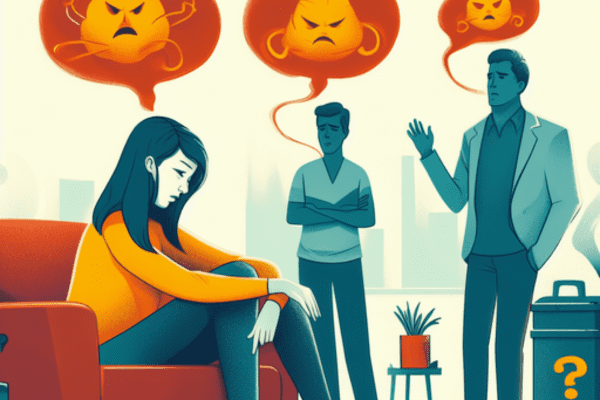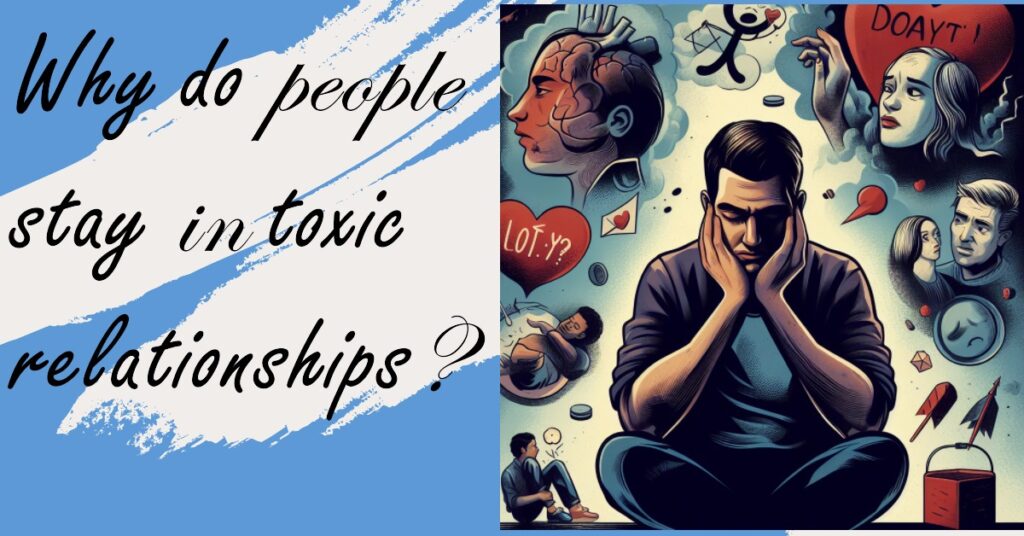Although outsiders can easily criticize a person’s decisions, it is more difficult to understand why do people stay in toxic relationships. Many things can make quitting impossible; this is where the complexity arises. When considering leaving an unpleasant relationship, people may find the discomfort of going more difficult than tolerating the toxicity.
In this article, we will look at the psychological, emotional, and social aspects that influence this problematic choice and clarify the conditions that lead individuals to remain in bad relationships.

Table of Contents
What is a toxic relationship?

A toxic relationship is a complex web woven of emotional, psychological, and sometimes physical threads where the foundation of mutual respect, support, and understanding collapses. Pervasive negative thinking penetrates the core of the relationship between two individuals and leaves a trail of emotional debris. In short, a toxic relationship is like a slow poison that slowly spreads throughout the relationship and destroys the well-being and happiness of those in its grip.
How to Identify a Toxic Relationship

A healthy and positive relationship is an integral part of our lives, but sometimes we can become toxic with our partner, affecting us and our lives. Identifying an unhealthy relationship to recognize the problems and move toward positive relationships is essential.
- Mistrust or fights in the relationship: If your partner attempts to control you or holds things against either of you, it could be a sign that you are in a toxic relationship.
- Not supporting a partner’s independence and self-liberation: In a positive relationship, the partner supports our personal growth and freedom. Still, this support may diminish in a toxic relationship, and the partner may distract us against our will.
- Lack of empathy and support: In a healthy relationship, the partner understands our needs and feelings and provides us with sympathy and support. Still, this support and kindness may be lacking in a toxic relationship.
It is essential to understand these signs to move towards positive and healthy relationships and make our lives joyful.
Why do people stay in toxic relationships?

There are many psychological, social, and emotional reasons why do people stay in toxic relationships, which are as follows:
Understanding Psychology
Fear of Being Alone

Fear of being alone is a significant reason people stay in unhealthy relationships.
Fear of being alone is a significant reason people stay in unhealthy relationships. Facing the obstacles of life alone can be frightening, leading some people to stay in toxic relationships with no one at all.
Low self-esteem
Leaving unhealthy relationships can be challenging for people with low self-esteem. Persistent manipulation and humiliation can lead to impaired self-perception, in which the victim feels worthy of the abuse.
Hope for Change
Because hope is a strong emotion, many people remain in unhealthy relationships, hoping their spouse will change. The complicated reality of these times can sometimes outweigh the optimism that things will get better.
External Pressure
Social Stigma

People feel pressure to remain in unhealthy relationships due to social norms and the shame associated with relationship status. Social norms and the fear of condemnation can overpower one’s well-being.
Financial Dependence
Reliance on a toxic partner’s finances can be a significant obstacle to quitting. Concern about the state of the economy can push people into poisonous relationships.
Emotional Investment
Sunk Cost Fallacy
In toxic relationships, the sunk cost fallacy is a factor. Even when it becomes clear that the relationship is unhealthy, people may feel that they have spent too much time and emotion trying to end it.
Emotional Rollercoaster
Intense emotional ups and downs are a common characteristic of toxic partnerships. Occasional moments of happiness can create a feeling of attachment, making breaking free from the pattern difficult.
Lack of Awareness
Denied
When in toxic relationships, denial is a common defensive strategy. People may refuse to acknowledge how serious things are, believing they are not as severe as they appear.
Normalization of Toxic Behavior
Toxic behavior may become more common over time. Desensitization may occur in victims who accept the abuse as a regular aspect of their relationship.
Fear of confrontation
Hatred of conflict
Some people will stop at nothing to avoid conflict. People may be reluctant to confront the poison in their relationships because they fear dissent and its potential consequences.
Fear of Retaliation
Fear of retribution plays a significant role in people continuing unhealthy relationships. Physical or psychological threats can instill fear and make escape dangerous.
Manipulation and Gaslighting
Gradual Manipulation
It may be difficult for victims to understand that a relationship is toxic until it becomes deeply ingrained in their lives because unhealthy relationships often dissolve slowly.
Gaslighting Tactics
One type of emotional abuse that can distort a victim’s sense of reality is gaslighting. If people are constantly deceived and denied the facts, they may question their sanity.
Breaking the Cycle
Recognizing the need for change
Realizing that change is necessary is the first step toward escaping a toxic relationship. This realization is an essential first step on the road to recovery.
Seeking Professional Help
Expert advice, such as therapy or counseling, can be beneficial in knowing how to get out of a toxic relationship.
Rebuilding Self-esteem
Self-reflection
Examining yourself and recognizing your value to reclaim your self-respect is crucial. Recognizing one’s skills and achievements can act as a launchpad for advancement.
Surround Yourself with Positivity
Fostering a good environment is essential to rebuilding self-esteem. Emotional recovery can be promoted by surrounding yourself with uplifting hobbies, joyful family, and supportive friends.
Building a Support System
Friends and Family
Having a solid network of friends and family can be very helpful for people looking to end unhealthy relationships. Their support and sympathy provide a safety net when things get tough.
Support Groups
Participating in support groups with people who have gone through comparable experiences can provide a sense of camaraderie and mutual strength on the path to freedom.
Learning from Experience
Gaining Insight
You can move forward by considering a toxic relationship. Learning about behavior patterns and warning signs can help avoid similar incidents.
Personal Development
Accepting the lessons from an unhealthy relationship is a step toward personal growth. It is a significant development when bad experiences can be catalysts for good.
Moving On
Setting Boundaries
Setting boundaries is necessary if you want to leave a toxic relationship behind. Setting limits for appropriate behavior is the cornerstone of a healthy relationship.
Embracing New Beginnings
Embracing a new beginning is an essential first step toward recovery. Beyond poison, people can find happiness and satisfaction in new relationships or personal endeavors.
The importance of Self-love
Value Oneself
Strategies for getting out of a toxic relationship depend mainly on developing self-love. Self-worth sets the standards for how one should be treated in relationships.
Prioritizing Mental Health
Making mental health a priority is an essential part of the process. Seeking expert help and practicing self-care are beneficial for general well-being.
Encouraging Others to Seek Help
Break the Silence
Encouraging candid discussion about unhealthy partnerships breaks down taboos around the topic. The first step in building a supportive community is to raise awareness.
Promote Awareness
Raising awareness through activism and education helps people identify the warning signs of unhealthy relationships with others. Providing people with information is essential to avoid long-term pain.
Read More: 8 Best Ways to Choose a Real-Life Partner
Conclusion
In short, why people stay in toxic relationships and the choice to continue in a toxic relationship are subtle and complex. It is essential to understand the psychological, social, and emotional aspects involved in order to develop empathy and support for people going through similar difficulties. Detoxification requires bravery, self-observation, and ongoing outside support. It is a journey of self-awareness and reclaiming value.
FAQs
Is it possible to get better from unhealthy relationships?
Although change is possible, it often requires a commitment to healing and personal growth from both couples.
How can family and friends support someone entangled in a poisonous relationship?
It is crucial to provide them with non-judgmental support, promote frank conversations, and help them access expert support.
Is it common for people who leave toxic relationships to re-enter them?
Apologies; that is accurate. People may find it challenging to end toxic relationships once and for all since they are cyclical.
What role does self-awareness play in breaking up with a toxic person?
Its basis is self-awareness. Breaking free from poison begins with accepting the need for change.
How can one tell the difference between bad and good relationships?
Good relationships thrive on mutual respect, communication, and support. Bad ones involve toxicity, a lack of trust, and constant conflict.
